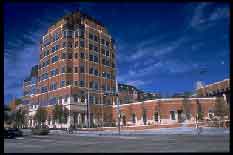
![]() INSTITUTE FOR NUCLEAR THEORY
INSTITUTE FOR NUCLEAR THEORY
|
The national Institute for Nuclear Theory (INT) was established in 1990 by the US Department of Energy and
is based at the University of Washington in Seattle, Washington.
The goals of the INT are: To create a research environment where
visiting scientists can focus their energies on key frontier areas of the field, including those crucial to the success of existing
and future experimental facilities. To encourage interdisciplinary research
at the intersections of nuclear physics with related disciplines, such as particle physics, astrophysics, atomic physics, and
condensed matter physics. The goals are to build greater appreciation, in the general physics community, for the tools of
nuclear physics and the breadth of their possible applications, and to assure that new ideas generated in other fields are quickly
assimilated and exploited by nuclear physics. To recruit and nurture the best young
researchers, thereby enhancing their professional prospects. The goal is to enlarge the pool of young nuclear physicists
who can compete for positions in leading universities and government/industry laboratories. To contribute to scientific education
through graduate student research, INT summer schools, and cosponsorship of national schools and workshops. To strengthen international cooperation in
nuclear physics and physics generally, through cooperative programs and exchanges.
INT activities can be divided into three areas: programs, local research, and an annual series of schools and small workshops.
|